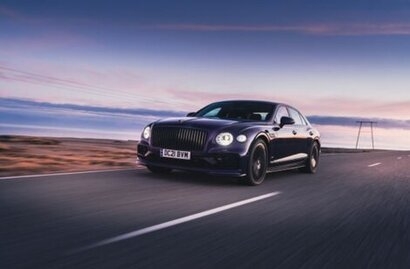
The dramatic test in which the vehicle covered 733 km (455 miles) was part of the car’s sign off and Bentley’s development of renewable fuels. The Flying Spur Hybrid utilised a combination of 100 per cent second generation biofuel and geothermally-sourced electricity available from the Icelandic power grid.
The journey is validation both of the grand touring range of Bentley’s new Hybrid – the second to be launched following the Bentayga Hybrid – and of Bentley’s research into biofuels that can be used without engine modification. The fuel used conforms to the same EN228 standard as ordinary pump gasoline, yet is created entirely from waste biomass (e.g. straw) at no cost to food production or the natural ecosystem. The combination of this fuel and the Flying Spur Hybrid’s intelligent electrified powertrain meant an overall reduction of 45 per cent in CO2 emissions on a well-to-wheels basis over the course of the adventure.
“It was great to see the car make the 733 km journey across the country on renewable electricity and green renewable fuel” said Þórdís Kolbrún Reykfjörð Gylfadóttir, Minister of Tourism, Industry and Innovation for Iceland, who witnessed the Flying Spur Hybrid’s journey. “Driving through the countryside with waterfalls on your left, and volcanos to the right you can visually see where the energy is generated directly, from nature. I think this is the best definition of sustainable energy. Iceland wants to be part of the environmental solution and help others use the knowledge and renewable sources we have here.”
The Flying Spur Hybrid represents Bentley’s next step on a journey to becoming the world’s most sustainable luxury mobility company, as laid out by the brand’s Beyond100 strategy. Market introductions across the world begin in 2022. This will see all models in the range offered with a hybrid powertrain by 2024, ahead of the company’s first full BEV by 2025.
“With the launch of the Flying Spur Hybrid we now have a hybrid range at Bentley, and with this challenge we’ve proved the real benefit of a hybrid – the ability to have an unimpeded grand touring reach of more than 450 miles, while still having usable electric-only range for urban environments” added Bentley’s Member of the Board for Engineering, Matthias Rabe. “It’s truly the best of both worlds, especially when the use of innovative second generation biofuel means a huge drop in CO2 emissions. We’ll continue working with such fuels in the coming months as part of our development process, with the end goal of a customer-facing solution.”
The use of renewable fuel is a significant step towards reducing Bentley’s environmental impact and supporting the company’s sustainability targets. This Icelandic journey is the result of further development since the debut of renewable fuel for Bentley in the Continental GT3 race car at the Pikes Peak International Hill Climb in June.
The 100 per cent renewable, second generation biofuel was developed by Coryton, who is supporting Bentley in renewable fuel research. The production process sees waste biomass (e.g. straw) broken down using fermentation, leading to the creation of ethanol. Dehydration of the ethanol converts it to ethylene, which can then be transformed into gasoline through the process of oligomerisation – chaining short hydrocarbon molecules together to produce longer, more energy-dense ones.
The electricity used by the car’s hybrid system during the journey was sourced from Iceland’s 100 per cent renewable grid. Iceland is a global leader in renewable energy production; 75 per cent of the country’s electrical energy is produced via Hydroelectric and 25 per cent from geothermal power. During its time in Iceland, the Flying Spur Hybrid was charged with electricity from the Svartsengi geothermal power plant.
The new powertrain combines a 2.9-litre V6 petrol engine with an advanced electric motor, delivering a total of 536 bhp (544 PS) and 750 Nm (553 lb.ft) of torque - an additional 95 bhp in comparison to the Bentayga Hybrid. The new Flying Spur becomes the most efficient Bentley ever having the capability to cover 700 km when fully fuelled.
Bentley Motors has outlined plans to become a global leader in sustainable luxury mobility with further details of its Beyond100 strategy. With the promise to offer truly sustainable luxury, Bentley is aiming to reinvent every aspect of its business to become an end-to-end carbon neutral organisation as it embarks on its second century. The target is driven by a transformation programme across Bentley’s entire operations and products. This includes switching its model range to offer exclusively plug-in hybrid or battery electric vehicles by 2026, and full electric vehicles only by 2030.
In 2018, Bentley’s production facility in Crewe became the first luxury automotive factory in the UK to be certified carbon neutral by the Carbon Trust, certification that has since been renewed twice. This followed two decades of implementing innovative solutions, including a water recycling system in the paint shop, local tree planting, installation of a 10,000 solar panel carport, taking the total number of on-site solar panels to 30,000, and a switch to renewable-only electricity sources.
The Crewe facility will continue to improve its environmental operations. All suppliers have passed a sustainability audit, verifying their sustainability credentials. In the future, by the end of 2025, the company intends to reduce its factory environmental impact by focusing on energy consumption, CO2 emissions, waste water, use of solvents in the paint process and becoming plastic neutral. This will result in a ‘climate positive factory’ by 2030, actively reducing levels of carbon in the atmosphere, while in parallel the business invests in renewable energy and forestation projects.
For additional information:

